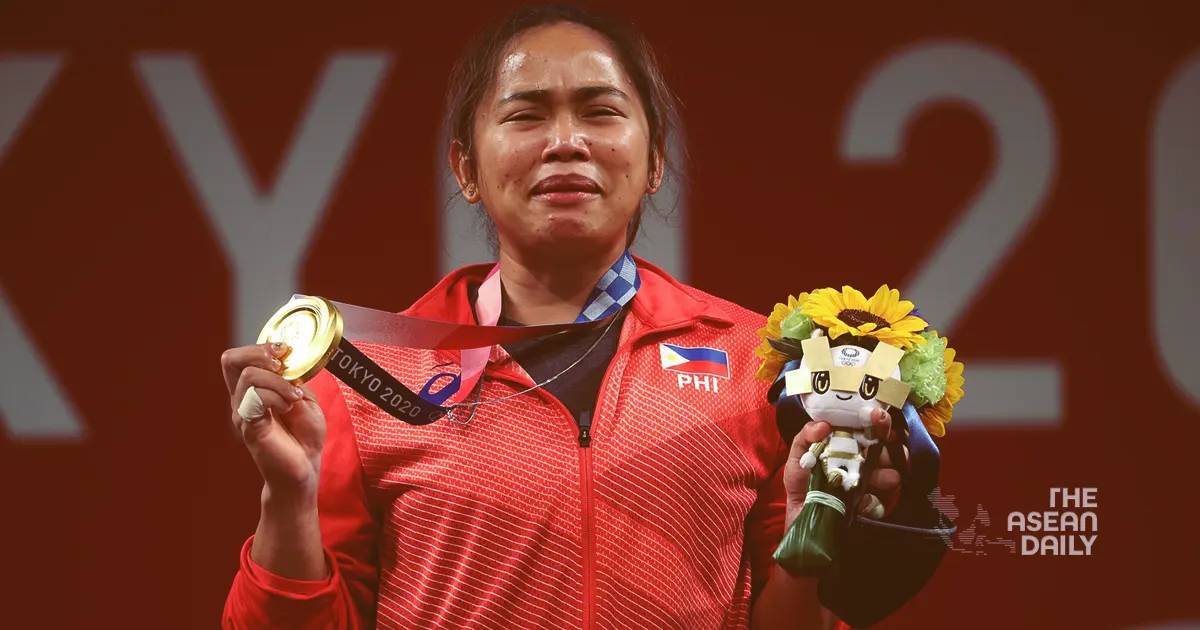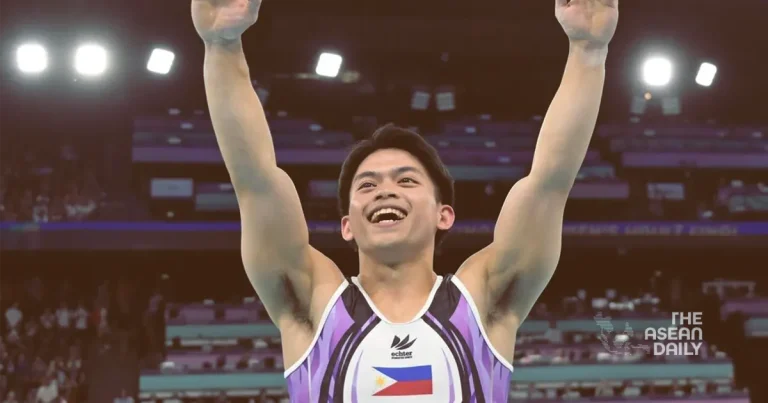10-8-2024 (MANILA) Last week, Philippine artistic gymnast Carlos Yulo made history by becoming only the second athlete from his country to secure an Olympic gold medal. Yulo’s impressive performance in the men’s floor and vault categories at the 2024 Paris Games echoes the groundbreaking achievement of Hidilyn Diaz, who clinched gold in women’s weightlifting three years prior.

The nation erupted in jubilation as news of Yulo’s success spread, with social media platforms buzzing with congratulatory messages. Many Filipinos saw these victories as a powerful statement against gender stereotypes in sports, celebrating the success of athletes excelling in disciplines traditionally associated with the opposite gender.
One social media user on X (formerly Twitter) eloquently captured the sentiment: “Filipinos are rejoicing over gold medals won by a woman in weightlifting and a man in gymnastics. This should convey the message that sports are gender-neutral, and we must cease allowing gender stereotypes to constrain our athletes’ potential.”
The discussion has prompted calls for Filipino parents to reconsider long-standing gender norms in sports, with many arguing that such preconceptions hinder children from reaching their full potential. Vince Liban, national convenor of PANTAY, a youth-led gender advocacy group, shared his thoughts on the matter: “Certain ‘abilities’ are still mistakenly linked to specific genders. Men are presumed to be strong, while women are expected to be graceful. These gendered expectations or stereotypes not only limit individual potential but also hinder societal progress. These biases are prevalent in sports, leading many to underestimate the strength of women and the grace of men.”
Liban added, “I regard Carlos Yulo and Hidilyn Diaz as champions not just in sports, but also for equality. They serve as compelling evidence that we can shatter stereotypes that restrict men, women, and athletes of diverse sexual orientations, gender identities, and expressions from achieving their utmost potential.”
The discourse surrounding Yulo’s gymnastics accomplishments has inevitably drawn comparisons to basketball, widely considered a national obsession in the Philippines. Basketball’s popularity is bolstered by substantial private funding due to its profitability and has long been viewed as a symbol of Filipino masculinity.
This perception has been a point of contention among the Philippines’ LGBTQ communities, for whom participation in certain sports has often been used as a measure of their sexuality and gender identity. Author Ian Rosales Cosacot highlighted this issue in a widely shared social media thread: “There’s an unspoken reason why many people are reassessing basketball in light of Carlos’ Olympic triumphs in gymnastics. For decades, basketball has symbolised Philippine machismo, showcasing a performative masculinity that many Filipino men aspire to.”
The roots of this association can be traced back to the American occupation of the Philippines in 1898. The United States introduced various aspects of their culture, including sports like boxing and basketball, with the latter becoming particularly ingrained through the public school system implemented across the country.
Athena Charanne Presto, a sociologist from the University of the Philippines, explained, “The Spanish normalised machismo, and the Americans introduced basketball. Due to patriarchal influences, these sports became deeply entrenched in Filipino culture.”
Presto noted that many Filipinos, especially those identifying as part of the LGBTQ community, have experienced judgement based on their gender expression or sexuality in relation to their interest or skill in sports, particularly basketball. “I’ve encountered numerous individuals who were compelled to play basketball in their youth or received basketballs as birthday gifts, despite having no interest in the sport,” Presto shared.
Similar gender expectations have been placed on women, with an interest in basketball often deemed socially inappropriate. Instead, athletically inclined women are typically encouraged to pursue volleyball, which boasts a popular all-women professional league in the country.
Despite the Philippines ranking 16th in the Global Gender Gap Report, behind only Australia and New Zealand in Asia, critics argue that this perceived gender inclusivity is superficial. A 2023 study by the Philippine Institute of Development Studies revealed that 99.5 per cent of Filipinos held biases against women.
Presto elaborated on this disparity: “If you’re a woman playing basketball, you risk being labelled a lesbian. From school to media representation and even within families, the coverage given to popular sports like men’s basketball and women’s volleyball teams demonstrates that gender norms and stereotypes are institutionalised.”
Cosacot, when contacted for comment, said: “I’ve received numerous responses to my tweets detailing parental or familial pressure – typically from older male relatives – to play basketball as a proof of manhood, and the disappointment that ensues when they fail to meet these expectations.”
He added, “Volleyball and gymnastics are somehow perceived as feminine sports. Consequently, if you were male and participated in these sports, your sexuality was often questioned.”
Even Yulo himself reportedly faced such speculations as a rising gymnastics star until he publicly revealed his relationship with his girlfriend on social media in 2022.
While Yulo’s Olympic success has sparked hope among observers and gender advocates for breaking down long-held gender stereotypes in sports and other fields, sociologist Presto cautions that a single event is insufficient to significantly shift gender expectations in sports.
“On social media, people are celebrating, and rightly so. However, we must acknowledge that one isolated event cannot serve as a watershed moment,” she stated. Presto emphasised the need for a “whole-of-society approach” to make sports more inclusive, with government and societal efforts working in tandem.
Government funding and resource allocation have long been contentious issues for Philippine athletes. The Philippine Sports Commission is set to receive over 720 million pesos (US$12.6 million) in funds next year, a 37 per cent decrease from the current year’s allocation.
This lack of support has led some athletes to accept offers to represent other countries, as exemplified by Wesley So, now the highest-rated chess player in the United States, who moved to represent the US Chess Federation in 2015.
Presto concluded, “If Carlos Yulo’s victory indeed catalyses proper investment in sports not deemed profitable, pushes the boundaries of gender norms, or drives certain policy changes or shifts in societal attitudes, then we can truly say that his win is phenomenal and societally transformative in that aspect.”




